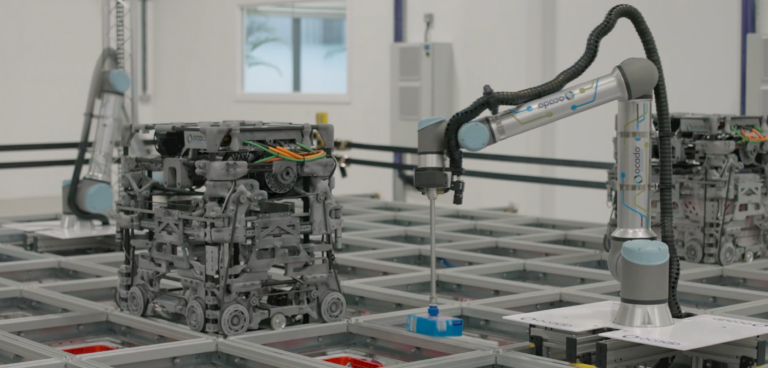Ocado Group has unveiled seven new robotic and automation technologies for its Ocado Smart Platform (OSP) designed to tackle the rise of rapid delivery companies and address labour shortage challenges.
Revealed during a briefing to analysts, Ocado Re:Imagined innovations include a new grocery fulfilment bot; lighter grids; robotic arms that pick groceries directly from the grid; a virtual distribution centre; a capability for short lead time deliveries; and a capability for powering retailers’ storefronts with the same technology behind the OSP.
Tim Steiner, chief executive of Ocado, said the new technology was “one of the most significant steps forward” in the company’s history and a “game changer” that would enable the group’s retail partners to automate picking in smaller local warehouses and provide a “compelling immediacy proposition” that could take on rapid-delivery firms that have grown during the pandemic.
Steiner said that while rapid-delivery firms fulfilled a role “for distressed purchases”, they offered customers “a very limited range of products and the most expensive last-mile delivery costs”.
According to Steiner, the new technologies are “transformational in the market and really drive our innovation forward” in a way that would “shatter the existing rules of the industry”. He said: “All companies we are working with are having challenges employing enough people to work”, so new technology would mean that workers could be redeployed from certain jobs to others and he did not expect waves of redundancies.
The new robots are intended to be combined with new software systems that will enable local delivery vans to be loaded more quickly, mixing orders made less than an hour before they set off with those made the night before. Steiner said the advancements would quicken the roll-out of new warehouses and mean that Ocado’s technology could serve different types of customers, not just supermarket clients.
Software will also link up smaller warehouses to create a system where products delivered to one can be shared between several locations to help improve efficiency.
Referencing the cause of the fires at Ocado’s Erith and Andover warehouses, Steiner said that improvements in its new robots meant there was less risk of the machines damaging their batteries. “The advancements to these robots are not focused on fire retardancy but they will slightly reduce the risk rather than increase the risk,” he said.
For Ocado Group, Steiner said Ocado Re:Imagined should offer higher returns from lower capital costs and operating expenses, a greater total addressable market available to the business, and the expectation of an acceleration in the sign-up of new partnerships, in addition to further orders from existing OSP partners.
Founded in 2000 by three former Goldman Sachs bankers, Ocado currently has seven warehouses in the UK that fulfil online grocery orders for Morrisons and its own brand, which it owns in partnership with Marks & Spencer. The online grocery retailer also licenses its software and automated warehouse technology to overseas supermarkets, including Kroger in the USA.







